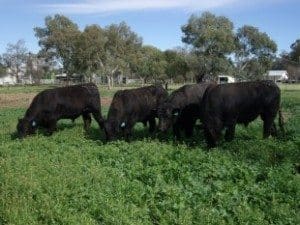The Australian beef industry will benefit with the completion of three years world-leading research on genetic traits to breed lower methane producing cattle.
Department of Primary Industries (DPI) Leader Beef Genetics, Dr Paul Arthur said the innovative research has produced the first and most comprehensive estimates of genetic parameters in the world for methane-producing traits in beef cattle.
“The genetic merit of methane emissions traits can now be described and will pave the way for the development of Estimated Breeding Values (EBVs) in our national genetic evaluation system BREEDPLAN®,” Dr Arthur said.
“Cattle producers have tools to potentially identify bulls whose offspring will produce less methane – without impacting on their productivity or profitability.
“In Australia about 10 per cent of all greenhouse gas emissions and two thirds of agricultural emissions come from methane produced by livestock, mainly produced by animals’ feed digestion. Reducing these emissions will be good for the environment.
“It is expected that in 10 years of selection using DNA based genomic breeding values, the animals born will produce 4-5 per cent less methane than animals at present.
Dr Arthur said they found that animals that use feed more efficiently for growth, naturally produce lower levels of methane gas.
“This means, Australian beef cattle producers are able to breed cattle that are more feed efficient, which reduces the cost of production and reduces methane emissions,” Dr Arthur said.
“Breeding these types of cattle will help to ensure an environmentally sustainable future for our industry.”
The DPI cattle methane team conducted the research in partnership with the University of New England. Research was also conducted with the Angus herd held at the DPI Trangie Agricultural Institute.
DPI Senior Beef Researcher at Trangie, Dr Kath Donoghue said that in just three years we have gained extensive knowledge into genetic improvement for methane traits.
“It is hoped with further funding we can continue this exciting field of research to assist the beef industry,” Dr Donoghue said.
This comprehensive research work is a great example of organisations working together collaboratively, with the co-operation of various scientists, technicians and support staff over many years.
The cattle methane reduction project is supported by co-funding from the Australian Government Department of Agriculture, as part of its Filling the Research Gap Program and Meat & Livestock Australia.
Source: NSW DPI. The final report – Genetic technologies to reduce methane emissions from Australian beef cattle is available on the DPI website


Dear Paul,
Methane is a form of energy released to the atmosphere.
There are two consequences on this:
1) Environmental: increase the release of Carbon
2) Productivity: energy released is not used by the animal, to increase production.
Any reduction of methane, will have a two way benefit, so tax payers money is well spent in this area.
Another waste of taxpayer money.